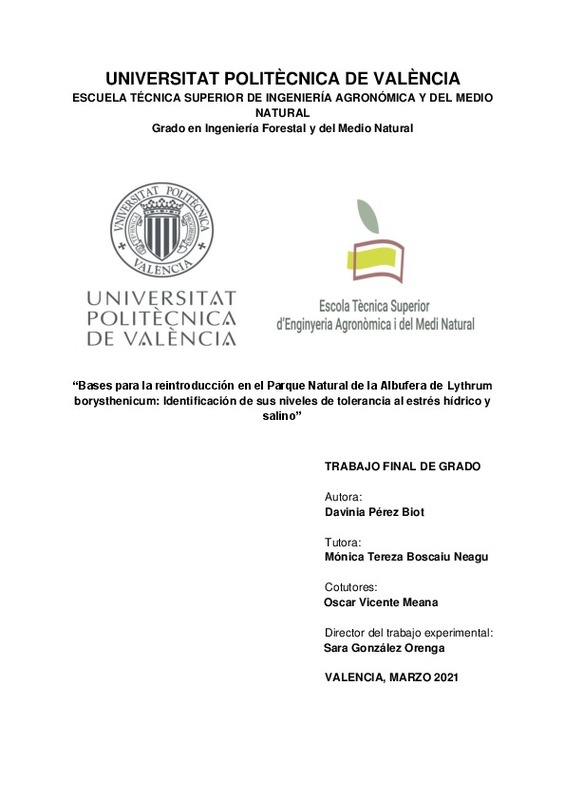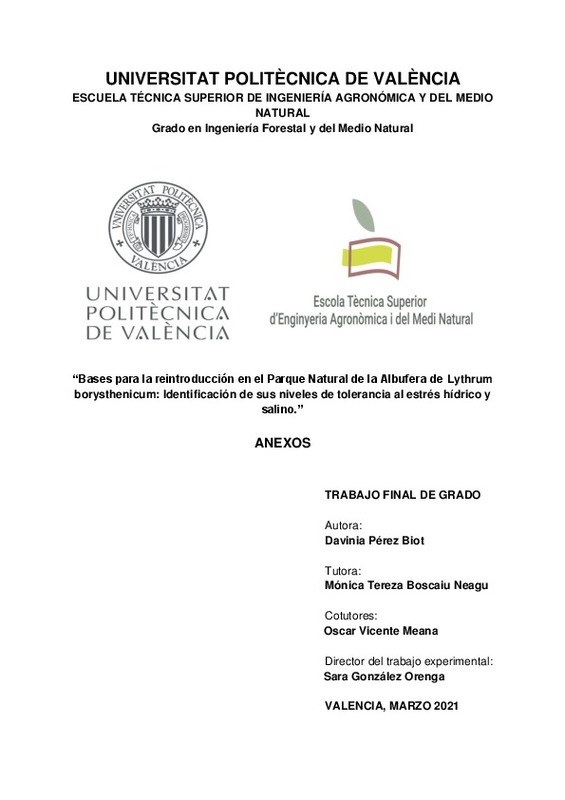JavaScript is disabled for your browser. Some features of this site may not work without it.
Buscar en RiuNet
Listar
Mi cuenta
Estadísticas
Ayuda RiuNet
Admin. UPV
Bases para la reintroducción en el Parque Natural de la Albufera de Lytrum borysthenicum: identificación de sus niveles de tolerancia al estrés salino e hídrico
Mostrar el registro sencillo del ítem
Ficheros en el ítem
| dc.contributor.advisor | Boscaiu Neagu, Mónica Tereza
|
es_ES |
| dc.contributor.advisor | Vicente Meana, Óscar
|
es_ES |
| dc.contributor.advisor | Ferrer Gallego, Pablo
|
es_ES |
| dc.contributor.advisor | González Orenga, Sara
|
es_ES |
| dc.contributor.author | Pérez Biot, Davinia
|
es_ES |
| dc.coverage.spatial | east=-0.3447564; north=39.3388043; name=Parque Natural de la Albufera, Valencia, España | es_ES |
| dc.date.accessioned | 2021-05-05T09:48:18Z | |
| dc.date.available | 2021-05-05T09:48:18Z | |
| dc.date.created | 2021-04-14 | |
| dc.date.issued | 2021-05-05 | es_ES |
| dc.identifier.uri | http://hdl.handle.net/10251/165989 | |
| dc.description.abstract | [ES] Varias especies del género Lythrum (familia Lythraceae) presentan un gran interés en la Comunidad Valenciana. L. borysthenicum es una especie de pastos terofíticos temporalmente encharcados, sobre suelos arenosos y pobres, recientemente extinguida en el Parque Natural de la Albufera. Es considerada como una de las especies de interés prioritario para su conservación en la Comunidad Valenciana. L. hyssopifolia es una especie con mayor presencia que la anterior, pero incluida en la categoría UICN con la categoría LC (preocupación menor). La tercera especie, L. salicaria, es una especie de amplia distribución y con elevada presencia en las zonas húmedas del territorio valenciano. El objetivo del trabajo es conocer los límites de la tolerancia al estrés salino e hídrico en L. borysthenicum con fines de reintroducción de esta especie en el Parque Natural de la Albufera. Las otras dos especies sirven como material comparativo. Las semillas de las tres especies serán proporcionadas por el Centro para la Investigación y Experimentación Forestal (CIEF) de la Generalitat Valenciana. Una vez germinadas en semilleros en condiciones de invernadero, las plántulas se pasan a macetas individuales y se someterán a tres concentraciones crecientes de NaCl y a un tratamiento de estrés hídrico, con ausencia completa de riego. Las plantas del tratamiento control se riegan con agua. La duración del ensayo dura en función de las respuestas de las plantas. Cuando el efecto del estrés se hace notable a nivel de crecimiento de las plantas, los tratamientos finalizan y el material vegetal se muestrea para su posterior análisis (número de hojas, longitud de tallo, peso fresco, peso seco, contenido hídrico, etc). El conocimiento de los límites de tolerancia a estos dos tipos de estrés es fundamental en la toma de decisión sobre las zonas idóneas de reintroducción de plantas amenazadas. Este proyecto se efectúa en colaboración con el CIEF y la Oficina Técnica Devesa-Albufera. | es_ES |
| dc.description.abstract | [EN] This work focuses on several species of the genus Lythrum (family Lythraceae), one of them with great interest of conservation in the Valencian Community. L. borysthenicumis a species of terophiticgrasses temporarily flooded, on sandy and poor soils, which has recently becomeextinct in the Albufera Natural Park. It is considered as one of the species with priority interest for conservation in the Valencian Community. L. hyssopifoliais a species with greater presence than the previous one, but considered of minor concern (least concern), a category assigned by IUCN (International Union for the Conservation of Nature). The third species, L. salicaria, is a taxon of wide distribution and with a high presence in the humid areas of the Valencian territory.The objective of the work wasto establish the limits of tolerance to water and saline stress in L. borysthenicum, knowledge useful for the reintroduction of this species in the Albufera Natural Park. L. hyssopifoliaand L. salicariawere used as comparative material.The knowledge of the limits of tolerance to these two types of stress is fundamental in the decision-making regarding the suitable zones for reintroduction of threatened plants. This project is carried out in collaboration with the Center for Forest Research and Experimentation (CIEF) of the Generalitat Valenciana (CIEF) and the Devesa-Albufera Technical Office. The seeds of the three species,provided by theCIEFwere sown in seedbeds with a mixture of soil, pearand pearliteingermination trays maintained in a growth chamber until germination. Seedlings were transferred to individual pots under greenhouse conditions a after four weeks,when plants acquired a sufficient size were initiated the salt stress treatments with twoincreasing concentrations of NaCl and a water stress treatment, by complete ceasing irrigation. The control treatment plants were irrigated with nutritive solution. When the effect of stress becamenoticeable at the level of plant growth, the treatments were finalized and the plant material sampled for further analysis (number of leaves, stem length, fresh weight, dry weight and water content).The species most tolerant to both salt and water stress was L. hyssopifolia, followed by L. borysthenicum. All three species are relatively tolerant to moderate salinity, as all plants survived to the end of the treatments. L. salicariawas affected mostly by water stress, treatment in which the reduction in fresh weight and leaf water content are greater than in the saline treatments. L. hyssopifoliais the one that shows the best conditions in the different treatments carried out under controlled conditions. | es_ES |
| dc.format.extent | 43 | es_ES |
| dc.language | Español | es_ES |
| dc.publisher | Universitat Politècnica de València | es_ES |
| dc.rights | Reserva de todos los derechos | es_ES |
| dc.subject | Lythrum | es_ES |
| dc.subject | Especies extintas | es_ES |
| dc.subject | Reintroducción de especies | es_ES |
| dc.subject | Conservación de la biodiversidad | es_ES |
| dc.subject | Estrés hídrico | es_ES |
| dc.subject | Saladares | es_ES |
| dc.subject | Salinidad | es_ES |
| dc.subject | Sequía | es_ES |
| dc.subject | Cambio climático | es_ES |
| dc.subject | Extinct species | es_ES |
| dc.subject | Water stress | es_ES |
| dc.subject | Salt stress | es_ES |
| dc.subject | Drought | es_ES |
| dc.subject | Salt marshes | es_ES |
| dc.subject | Species reintroduction | es_ES |
| dc.subject | Plant conservation | es_ES |
| dc.subject | Global warming | es_ES |
| dc.subject.classification | BIOQUIMICA Y BIOLOGIA MOLECULAR | es_ES |
| dc.subject.classification | BOTANICA | es_ES |
| dc.subject.other | Grado en Ingeniería Forestal y del Medio Natural-Grau en Enginyeria Forestal i del Medi Natural | es_ES |
| dc.title | Bases para la reintroducción en el Parque Natural de la Albufera de Lytrum borysthenicum: identificación de sus niveles de tolerancia al estrés salino e hídrico | es_ES |
| dc.type | Proyecto/Trabajo fin de carrera/grado | es_ES |
| dc.rights.accessRights | Abierto | es_ES |
| dc.contributor.affiliation | Universitat Politècnica de València. Departamento de Ecosistemas Agroforestales - Departament d'Ecosistemes Agroforestals | es_ES |
| dc.contributor.affiliation | Universitat Politècnica de València. Escuela Técnica Superior de Ingeniería Agronómica y del Medio Natural - Escola Tècnica Superior d'Enginyeria Agronòmica i del Medi Natural | es_ES |
| dc.description.bibliographicCitation | Pérez Biot, D. (2021). Bases para la reintroducción en el Parque Natural de la Albufera de Lytrum borysthenicum: identificación de sus niveles de tolerancia al estrés salino e hídrico. Universitat Politècnica de València. http://hdl.handle.net/10251/165989 | es_ES |
| dc.description.accrualMethod | TFGM | es_ES |
| dc.relation.pasarela | TFGM\107755 | es_ES |
Este ítem aparece en la(s) siguiente(s) colección(ones)
-
ETSIAMN - Trabajos académicos [3541]
Escuela Técnica Superior de Ingeniería Agronómica y del Medio Natural







